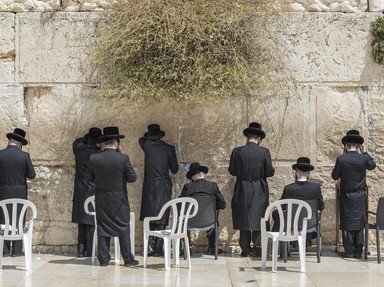25. Where was the last battle of the revolt fought?
From Quiz Shimon Bar Kokhva
Answer:
Betar
Betar was a heavily fortified main city on a mountain ridge that housed over 400 synagogues, the Jewish High Courts (Sanhedrin) and the President (Nasi). It guarded on one side the main road from Jerusalem to Beit Guvrin, and on the other side the entire Sorek Valley. It had high walls and housed the bulk of Bar Kokhva's army.
Julius Severus laid siege to the city with what remained of his still formidable army, and even though it was summer and the land was scorchingly hot, the defenders remained firm. It was said that the city was supplied from subterranean secret tunnels, and the defenders had great faith, and prayed every night and day for the safety of the city.
One day a Samaritan snuck into the city and pretended to whisper into Rabbi Elazar HaModa'i's ear. The soldiers were suspicious and arrested the Samaritan, but the Samaritan refused to speak, and was eventually put to death. When Rabbi Elazar was questioned, he (rightly) had no idea what the soldiers were talking about. Bar Kokhva was so enraged that he kicked over the Rabbi, and in the Rabbi's weakened state he died. The defenders were broken, because a prophesy foretold that as long as Rabbi Elazar lived and prayed for the safety of the city, the city wouldn't fall.
A few days after Rabbi Elazar's death, on the 9th of Av, the anniversary of the destruction of both the First and Second Temples, the Roman army entered Betar. Sources show that a Samaritan traitor showed the Romans a secret way into the city, and in the Jews' degraded mental and physical state, it was no contest. The Jews were also demoralized by the death of Rabbi Elazar. The battle was bloody and vicious, but in the end the Romans prevailed.
Over half a million bodies were left dead on the battlefield, but the Romans denied the Jews the right to bury their dead for six days. In the battle, Bar Kokhva was caught, as were the sages of the Jews. The revolt was essentially over, except for a few small skirmishes in the Judean desert, and most of the Jewish males were put to death or sold into slavery. Thus ended the Bar Kokhva revolt.
The fate of Bar Kokhva is uncertain, but it was said that no man could kill him, so God sent a snake into his cell, and thus he died. Rabbi Akiva was tortured and publicly executed, along with nine of the main sages, and they were ever known as the ten martyrs.





 Quick Question
Quick Question = Top 5% Rated Quiz,
= Top 5% Rated Quiz,
 Top 10% Rated Quiz,
Top 10% Rated Quiz,